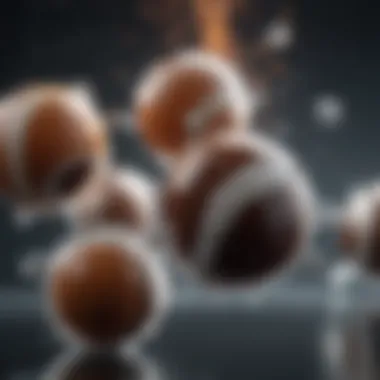Caffeine and Its Impact on Erectile Dysfunction


Intro
Understanding the complexities of men's health goes beyond the descriptions and terminologies that fill medical textbooks. One topic that has raised many eyebrows in recent years is the nuanced relationship between caffeine consumption and erectile dysfunction. While caffeine is often celebrated for its stimulating properties, questions regarding its potential effects on sexual health have become increasingly pertinent.
It’s essential to note that the link between caffeine and erectile function is not straightforward. Various factors intertwine—physiological responses, lifestyle choices, and even psychological aspects come into play. Given that many men start their day with a cup of coffee or energy drink, exploring this connection deserves thorough examination. The aim of this article is to dissect these multifaceted relationships and provide a well-rounded perspective.
As we delve deeper, we will not only consider the possible advantages caffeine might offer but also investigate how excessive intake could carry risks. We are providing a balanced view, addressing both the brighter and more shadowy aspects of caffeine consumption in the realm of men's sexual health.
Intro to Caffeine and Sexual Health
Caffeine is not merely a morning ritual for many individuals; it often plays a pivotal role in daily life. This stimulant, found primarily in coffee, tea, and certain soft drinks, has become inextricably woven into the social fabric of modern routines. Knowing how it impacts various aspects of health, particularly sexual health, is crucial.
When we turn our attention to sexual health, we uncover a complex and multifaceted issue, particularly concerning men. One of the most talked-about topics today is erectile dysfunction (ED). This condition affects many men globally and can significantly impact both psychological and relational aspects of life. Understanding the intricate relationship between caffeine and these issues provides a pathway to better health outcomes.
Why This Matters
For health professionals, wellness coaches, and educators, grasping the dynamics at play is essential. The consumption of caffeine can yield various effects on the body, including potential implications for erectile function. While some studies suggest that moderate caffeine intake might have beneficial effects, excessive consumption could lead to adverse outcomes. Articulating these nuances will help in making informed recommendations.
Moreover, analyzing how caffeine interacts with other lifestyle factors—such as diet, exercise, and mental health—can enhance an individual's overall well-being. Caffeine, being a double-edged sword, exemplifies how lifestyle choices can contribute to or undermine sexual health. Hence, addressing the balance of caffeine consumption is not just a matter of personal choice; it involves understanding its possible effects and integrating this knowledge into a broader health framework.
In this article, we will dig deeper into what caffeine is, how it interacts with the body, and ultimately scrutinize its relationship with erectile dysfunction in men, shedding light on both sides of the argument.
Understanding Caffeine: What It Is
Caffeine is a natural stimulant that primarily affects the central nervous system. It is chemically classified as a xanthine alkaloid. The most common sources include coffee beans, tea leaves, cocoa beans, and kola nuts. When consumed, caffeine is absorbed into the bloodstream and begins to exert its effects within minutes.
Key aspects of caffeine include:
- Stimulation of the Central Nervous System: Enhances alertness and reduces fatigue.
- Diuretic Effect: Increases urine production, which can result in the loss of fluids.
- Increased Heart Rate: Can lead to variations in heart rhythm.
Moderate consumption of caffeine is generally considered safe for most people and may even offer health benefits, such as improved cognitive function. However, it's the quantity of intake that starts to raise questions, particularly when examining how it interacts with other bodily functions, including sexual health.
Erectile Dysfunction: A Brief Overview
Erectile dysfunction, often referred to simply as ED, is the inability to achieve or maintain an erection sufficient for satisfactory sexual performance. This condition can have numerous causes, including physical conditions, psychological factors, and lifestyle choices. Statistics indicate that a significant percentage of men at different ages experience some form of ED, and the numbers tend to rise with age.
Understanding ED involves recognizing some common risks and contributing factors:
- Age: Older men are more likely to experience ED.
- Chronic Illnesses: Diabetes and hypertension can impede blood flow and lead to erectile issues.
- Mental Health: Anxiety, depression, and stress can have considerable effects on sexual function.
- Lifestyle Choices: Smoking, excessive alcohol consumption, and lack of exercise are notable contributors.
While the topic may seem prevalent, the stigma attached often prevents men from discussing it openly, adding layers of emotional distress. As research continues to emerge, the intersection of lifestyle factors, like caffeine consumption, becomes a vital area for exploration.
"Understanding the nuances of caffeine's impact on sexual health can empower men to make informed lifestyle choices and seek appropriate help when needed."
Caffeine’s role, whether beneficial or harmful, in relation to erectile dysfunction needs close examination. This lays the groundwork for further sections, where we will explore the mechanisms of caffeine within the body and its potential effects on erectile function.
How Caffeine Works in the Body
Understanding how caffeine operates within the human body is crucial to grasp its potential effects on sexual health, particularly in relation to erectile dysfunction. Caffeine, a central nervous system stimulant commonly found in coffee, tea, and energy drinks, interacts with various biological pathways that can have contrasting influences on bodily functions. Here, we dive into the mechanisms of caffeine’s action and its impacts on blood flow and circulation, both of which play significant roles in sexual performance and satisfaction.
Mechanisms of Action: Stimulant Effects
Caffeine primarily acts by blocking the adenosine receptors in the brain. Adenosine is a neurotransmitter that promotes relaxation, thus when caffeine interferes with its action, it can lead to increased alertness and reduced fatigue. This stimulant effect is often what lures individuals to consume caffeine to enhance their focus or energy levels.
However, the implications of this action extend beyond mere wakefulness. The blockage of adenosine could potentially lead to heightened sympathetic nervous system activity, resulting in increased release of catecholamines like adrenaline. This hormone boosts heart rate and energy metabolism.


- Benefits of Stimulant Effects:
- Increased energy levels, which can indirectly improve sexual performance by enhancing vigor and stamina.
- Improved mood, possibly contributing to a more positive sexual experience.
But it's important to recognize that an overreliance on stimulants can lead to jitteriness, anxiety, and insomnia, all of which certainly don’t do any favors for one's sexual health.
Impact on Blood Flow and Circulation
The role of caffeine in influencing blood flow is particularly noteworthy. When consumed, caffeine causes vasodilation initially, which is the widening of blood vessels. This occurs because caffeine can stimulate the release of nitric oxide, a molecule that plays a key role in vascular function.
In a balanced context, increased blood flow can enhance erectile function, as ample circulation is essential for achieving and maintaining erections. However, there's a bit of a balancing act at play. While some studies suggest moderate caffeine consumption might improve erectile function, excessive intake may lead to negative effects, including elevated blood pressure and potential vascular strain.
"Blood flow is critical for sexual arousal; caffeine can either facilitate or hinder this process depending on the amount consumed."
In summary, while caffeine can enhance alertness and circulation to some degree, the effects on erectile function are nuanced. It's a double-edged sword. The dose makes the poison, and a careful approach toward caffeine consumption can facilitate better health outcomes.
- Key Takeaways:
- Moderate caffeine intake may boost energy and enhance blood flow.
- Overconsumption could lead to adverse effects, particularly regarding vascular health and erectile function.
Understanding caffeine's complex role further emphasizes the need for a mindful approach to dietary habits, especially for those concerned with sexual health.
Exploring the Connection Between Caffeine and Erectile Dysfunction
The topic of caffeine and its possible relationship with erectile dysfunction holds significant relevance today. As more men face sexual health issues, understanding any dietary factors that could either exacerbate or alleviate the problem is essential. Caffeine, a common stimulant found in coffee, tea, and soft drinks, has long been studied for its diverse physiological effects. Yet, its connection to sexual health—specifically erectile dysfunction—remains somewhat murky.
What makes this exploration critical is the dual nature of caffeine's impact. On one hand, it boasts benefits such as increased alertness and enhanced performance in various physical activities, while on the other hand, excessive consumption may lead to adverse effects related to hormonal and vascular health. Given that erectile dysfunction can have deep psychological, relational, and physical repercussions, a deeper understanding of caffeine's role offers insights not only for individual health but also for broader therapeutic approaches.
Caffeine and Hormonal Balance
Caffeine’s influence on hormonal balance is multifaceted and quite intricate. It directly affects several hormones that play key roles in sexual function. The most notable of these is testosterone. Research suggests that caffeine may have the potential to boost testosterone levels, particularly in individuals who consume moderate amounts. This could have a beneficial effect on libido, given the hormone's significant influence on sexual desire and performance. However, there is a caveat: excessive intake might lead to increased stress hormones, such as cortisol, which could negatively affect testosterone levels, skewing this delicate balance.
Moreover, the timing of caffeine consumption matters. For instance, an early morning espresso might help kickstart metabolism and enhance energy levels, possibly contributing to improved sexual stamina. Conversely, gulping down a pot of coffee just before bed might disrupt sleep patterns, which in turn can lead to reduced testosterone production overnight.
The bottom line here is that moderation and timing are key. Understanding one's personal tolerance and adjusting consumption accordingly can be instrumental in maintaining this hormonal equilibrium, which is vital for sexual health.
Potential Vascular Implications
When discussing erectile dysfunction, it's essential to consider the vascular implications of caffeine consumption. Erection itself is a vascular phenomenon; it involves intricate processes that require proper blood flow and circulation to the penile region. Caffeine is known to be a vasodilator, meaning it helps to widen blood vessels, increasing blood flow. In theory, this could be beneficial for those experiencing erectile dysfunction.
However, the relationship is not so straightforward. While moderate caffeine intake may enhance blood circulation temporarily, overconsumption could lead to other health issues. For instance, persistent high caffeine levels can contribute to elevated blood pressure, leading to long-term vascular problems that could hinder erectile function. Furthermore, individuals with pre-existing vascular issues or those on certain medications may experience adverse effects, making it crucial to consider one’s full health context.
To summarize, while caffeine does have the potential to enhance blood flow, its effect can be entirely opposite based on individual health circumstances, amount consumed, and method of intake. Essentially, caffeine's impact on vascular function introduces yet another layer of complexity in the dialogue about erectile dysfunction. Hence, it becomes imperative to strike a balance and consult with health professionals for personalized advice regarding caffeine consumption.
Existing Research on Caffeine and Sexual Health
Moreover, researching this topic offers insights into broader health patterns. It allows health professionals, wellness coaches, nutritionists, fitness trainers, and mindfulness instructors to discern how dietary choices and lifestyle factors interplay with sexual well-being. By appreciating the nuances, one can develop tailored strategies to navigate testosterone levels, circulation, and overall vitality, hence impacting men’s quality of life significantly.
"The investigation of caffeine's impact on erectile functionality illuminates a path toward healthier lifestyle choices for many men."
Digging into existing research helps highlight both benefits and adverse outcomes. While caffeine may offer some performance boosts—like heightened alertness—it's crucial to weigh that against its potential drawbacks, especially for men facing erectile dysfunctions.
Review of Recent Studies
Several recent studies have embarked on elucidating caffeine's influence on sexual health. One noteworthy study published in the American Journal of Clinical Nutrition examined a large cohort, revealing a correlation between moderate caffeine consumption and improved erectile function. The results suggested that men who consumed around two to three cups of coffee daily demonstrated a lower incidence of erectile issues compared to those who abstained or consumed excessively.
It's not merely caffeine itself that's in the spotlight; rather, the way it interacts with various body systems is equally relevant. Researchers posited that caffeine could enhance nitric oxide production—an essential component for achieving an erection. Enhanced blood flow appears to be a possible underlying mechanism supporting this correlation.


On the flip side, a separate investigation pointed out that excessive caffeine intake might lead to anxiety and restlessness, potentially exacerbating erectile dysfunction symptoms. Men with heightened stress levels may face challenges in sexual performance, thus illustrating the complex relationship between caffeine and sexual health.
Contrasting Findings: Caffeine’s Benefits and Risks
The academic landscape isn't all rosy. There's a clear divergence when it comes to understanding the implications of caffeine for erectile function. While some studies advocate for moderate consumption's benefits, others outline potential risks connected to high doses.
Benefits:
- Enhanced Blood Circulation: As previously mentioned, moderate caffeine consumption could contribute positively by improving erectile function through increased blood flow.
- Stress Reduction: Caffeine may serve as a pick-me-up, aiding some in managing daily stresses effectively. Lowering anxiety levels can indirectly support better sexual performance.
Risks:
- Anxiety and Jitters: High caffeine levels might induce anxiety, which can inhibit sexual arousal or performance. An anxious mind often struggles to engage effectively in intimacy.
- Health Conditions: For men with preexisting vascular or hormonal issues, excessive caffeine can aggravate conditions that contribute to erectile dysfunction.
In sum, while existing research offers a glimpse into the multifaceted relationships between caffeine and erectile dysfunction, striking a careful balance is paramount. Everyone's individual response to caffeine varies; hence it demands consideration in personalized health interventions.
In light of these findings, it's clear that further rigorous studies are necessary to map out these intricate connections fully and help men navigate their choices effectively.
Lifestyle Factors Influencing Caffeine’s Effects
Understanding how lifestyle factors play into caffeine’s impact on erectile dysfunction is crucial for a balanced perspective on male sexual health. It’s not just about how much caffeine one consumes, but rather how other elements in daily life interact with that consumption. Lifestyle factors do not operate in a vacuum; they intertwine with physiological responses and can significantly alter how caffeine manifests its effects on the body. Let’s dissect some of the most pertinent aspects.
Diet and Nutrition
Diet is a pivotal element that shapes the caffeine experience. What we eat alongside caffeine can modulate its effects. For instance, a diet rich in phytonutrients found in fruits and vegetables can bolster vascular health. In contrast, diets high in saturated fats can impede circulation. Hence, caffeine consumption might yield different results based on these dietary patterns. If you combine caffeine with nutrient-poor snacks, you may be courting trouble when it comes to erectile function.
- Hydration: Consuming caffeine dehydrates the body. Staying well-hydrated with water can counter this diuretic effect, supporting better circulation.
- Timing of Food Intake: Having caffeine on an empty stomach can lead to heightened anxiety or jitters. Pairing caffeine with balanced meals helps maintain stable energy and mood levels throughout the day.
"You are what you eat; thus, the synergy between your diet and caffeine cannot be overlooked."
Physical Activity and Exercise
Exercise is another cornerstone of health that can either enhance or undermine the benefits of caffeine. Regular physical activity is known to boost blood flow and support healthy erectile function. While caffeine can improve endurance and performance during workouts, inactivity can negate these positive aspects.
Consider this:
- Aerobic exercise, like running or cycling, promotes cardiovascular health, allowing your chances of achieving and maintaining an erection to flourish when combined with caffeine.
- Resistance training can elevate testosterone levels, which might improve sexual health.
In contrast, a sedentary lifestyle is a recipe for poor circulation and increased risk for erectile dysfunction, even if caffeine is a regular part of the diet.
Stress and Mental Health Factors
Lastly, mental health plays a significant role that shouldn’t be underestimated. Stress can lead to all sorts of physiological responses that might inhibit sexual function. When caffeine consumption is paired with high stress, the typical stimulant effects might tip the scales toward anxiety rather than energy, ultimately affecting sexual performance negatively.
Here are some aspects to consider:
- Caffeine and Cortisol Levels: High caffeine intake in conjunction with stress can elevate cortisol, which is known to hinder testosterone production.
- Mindfulness Practices: Engaging in mindfulness or meditation can counteract those negative effects and harmonize caffeine consumption with well-being.
In summary, lifestyle factors like diet, physical activity, and mental health intersect with caffeine consumption, creating a complex web that can influence erectile health. Understanding these relationships empowers individuals to make informed choices and potentially mitigate risks associated with excessive caffeine intake.
Caffeine Consumption Guidelines
Understanding caffeine consumption is crucial for those looking to optimize their sexual health, particularly concerning erectile function. The complexities of how much caffeine is beneficial—or potentially harmful—cannot be overlooked. By establishing consumption guidelines, individuals can navigate their caffeine intake while remaining mindful of both their overall health and intimate well-being.
Recommended Limits for Healthy Adults


In the realm of caffeine consumption, moderation is the name of the game. Health organizations generally suggest that healthy adults can consume up to 400 milligrams of caffeine per day, which roughly translates to about four cups of brewed coffee. However, this value can vary depending on factors like age, weight, and overall health.
Key Points:
- Individual Variation: Factors, such as genetics and existing health conditions, can influence how caffeine affects an individual. For instance, those with hypertension might need to keep their intake lower.
- Effect on Erectile Function: While moderate caffeine intake may not pose risks, excessive amounts can lead to elevated heart rates, anxiety, or sleep disturbances, all of which could indirectly influence erectile function.
- Quality over Quantity: The type of caffeine also matters—coffee, tea, energy drinks, and soft drinks have different nutritional profiles. Choices matter!
"Coffee is a daily grind that fuels many lives—yet finding the right balance can keep it from becoming a grind itself."
Identifying Individual Tolerance Levels
Each person's reaction to caffeine varies, making it essential to identify one's own tolerance. This process requires paying attention to both the physical and psychological cues that caffeine provides.
Ways to Gauge Tolerance:
- Start Small: Initiating with a small dose and progressively increasing allows the body to adjust.
- Monitor Reactions: Keeping track of how your body responds, whether through jitters, anxiety, or even improved mood, can signal what works best.
- Daily Log: Maintaining a log can illuminate patterns over time. Record the type and amount of caffeine consumed alongside any noted effects on energy levels or sexual health.
Understanding personal tolerance helps in crafting a tailored caffeine strategy. By knowing where you stand with caffeine, you can create a healthier balance that fits within your lifestyle and keeps erectile dysfunction at bay.
Addressing Erectile Dysfunction
Erectile dysfunction, or ED, is a condition that affects a substantial number of men, creating not only physical discomfort but also emotional and psychological stress. The significance of discussing this topic arises from the multifaceted nature of erectile function and its ties to overall health, including lifestyle choices like caffeine consumption. Addressing these elements is crucial because understanding how various factors, such as diet and mental well-being, can influence sexual health is key to finding effective solutions. Furthermore, medical guidance and alternative approaches to treatment could be the difference between resilience and frustration for many.
Medical Advice and Treatment Options
When men face erectile dysfunction, seeking professional advice should be a priority. Various treatment options exist, tailored to the underlying causes of the issue. Medications like Viagra, known generically as sildenafil, work by enhancing blood flow to the penis, facilitating an erection. Other oral medications include tadalafil and vardenafil, each with unique qualities and side effects.
However, it’s also essential to not overlook the holistic approach to ED. Physicians often recommend lifestyle modifications as the first line of defense. These can include:
- Weight management: Maintaining a healthy weight can reduce the risk of conditions such as diabetes, which is a significant contributor to erectile dysfunction.
- Exercise: Regular physical activity boosts cardiovascular health, a foundational element in achieving lasting erectile function.
- Dietary improvements: Aligning with nutritional principles—like increased intake of fruits, vegetables, and whole grains—can directly impact vascular health.
Medical practitioners may also consider hormonal assessments, as imbalances in testosterone levels can be contributors to erectile dysfunction. If needed, hormone replacement therapy can provide substantial relief in these scenarios.
Alternative Therapies
In recent years, alternative therapies have garnered interest as adjuncts or complements to traditional treatments. These approaches may provide some men with options where conventional methods have been ineffective or where there are concerns about adverse side effects. Some widely discussed alternative therapies include:
- Psychotherapy: Emotional and psychological challenges are often at the root of erectile dysfunction. Therapy can help address issues such as anxiety, depression, and stress, playing a pivotal role in reclaiming sexual function.
- Acupuncture: Although controversial, some men have reported improvements in erectile dysfunction through acupuncture treatments. This ancient practice aims to promote energy flow and enhance overall well-being.
- Herbal supplements: There are various natural remedies claimed to assist with ED. Ingredients like ginseng, L-arginine, and yohimbine may have some supportive roles according to anecdotal evidence, though clinical backing can vary.
"Understanding the interaction between lifestyle choices, like caffeine intake, and erectile function can lead to more informed decisions and better outcomes."
Ending and Recommendations
In navigating the often murky waters of caffeine consumption and its impact on erectile dysfunction, it's essential to stop and take stock. The role of caffeine in sexual health, while complex, is increasingly relevant in today’s fast-paced world where coffee and energy drinks fuel many individuals. Understanding how this stimulant interacts with bodily systems can illuminate pathways for enhancing sexual function and overall wellbeing.
Balancing Caffeine in a Healthy Lifestyle
Finding a balance with caffeine consumption is no easy feat. For many, caffeine is a daily ritual, a comfort that can also be tied to social interactions. However, moderation is critical. While caffeine can offer benefits like increased alertness and improved mood, excessive intake might lead to unwanted side effects, including anxiety, insomnia, and even, as we've explored, potential contributions to erectile dysfunction.
To help maintain a healthy association with caffeine, consider these strategies:
- Mindful Consumption: Keep a diary of your caffeine intake. This will help identify how it correlates with mood and sexual health.
- Quality Over Quantity: Opt for high-quality coffee or tea with fewer additives instead of sugary energy drinks, which can exacerbate health issues.
- Hydration is Key: Always balance caffeine with adequate water intake; dehydration can negatively impact body function.
- Dietary Adjustments: Pair caffeine with nutritious foods. A balanced meal can mitigate the jittery effects caffeine often has on the body.
"A healthy lifestyle is about balance. Caffeine can be a friend if invited to the right context."
Encouragement for Ongoing Health Monitoring
Staying attuned to one’s health is imperative, particularly regarding sexual health and caffeine's role therein. Encourage clients and patients to engage in periodic health evaluations. These assessments can highlight subtle shifts in their response to caffeine, potentially allowing for early interventions should changes occur.
It's wise to:
- Schedule Regular Check-ups: Routine health screenings can help to identify issues like blood pressure and hormonal imbalances which might be exacerbated by caffeine.
- Keep an Open Dialogue: Encourage patients to discuss any changes in sexual function candidly with healthcare providers. This communication can often lead to tailored advice that considers caffeine consumption.
- Educational Initiatives: Foster understanding through workshops or seminars about the relationship between diet, lifestyle, and sexual health to empower individuals in making informed choices.
In summary, while caffeine is deeply woven into the fabric of modern life, understanding its complexities and being mindful of consumption habits can foster healthier outcomes and potentially mitigate risks associated with erectile dysfunction. Continual monitoring and open communication remain key pillars in maintaining one's sexual health and overall quality of life.















